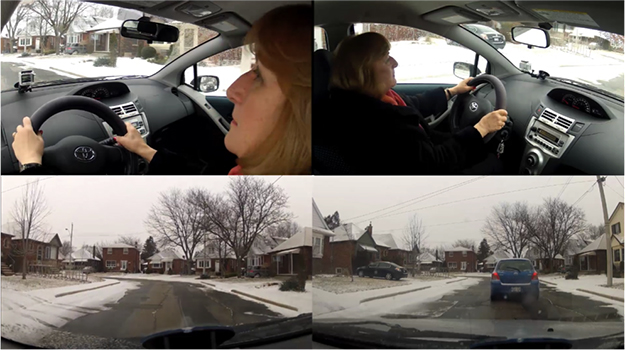How’s my driving? Mac PhD finishes second in national automotive research competition

Researchers from McMaster have helped develop an in-car recording system that uses GPS-technology to capture driving patterns and HD cameras to capture actual behaviour behind the wheel. This image shows three camera views within the participant's vehicle that provide the researchers with a 180-degree view of the outside and inside of the car, and include the participant. The fourth camera captures the participant's vehicle within the environment.
McMaster student Kinga Eliasz has finished second in the 2014 AUTO21 TestDRIVE competition.
She was recognized for her work to help develop an in-car recording system that uses GPS-technology to capture driving patterns and HD cameras to capture actual behaviour behind the wheel.
Eliasz, a PhD candidate in kinesiology, said this is the first study in the world that objectively quantifies driving behaviour in a comprehensive way to understand the older driver — a rapidly growing demographic.
“Kinga and I share a passion for enabling older adults to stay healthy and mobile for as long as possible,” said Brenda Vrkljan, an associate professor in rehabilitation science and Eliasz’s project supervisor.
Her research team develops evidence-based methods to keep older drivers safe behind the wheel for as long as possible.
“We were fortunate that Kinga came on board to assist with our project,” said Vrkljan. “She has wonderful presentation and people skills, which helped her convey the importance of our research and its translation to tangible product.”
Read more about the team’s work in The Hamilton Spectator: “McMaster pair keep seniors safe behind the wheel”
PhD candidate and McMaster researcher Kinga Eliasz:


